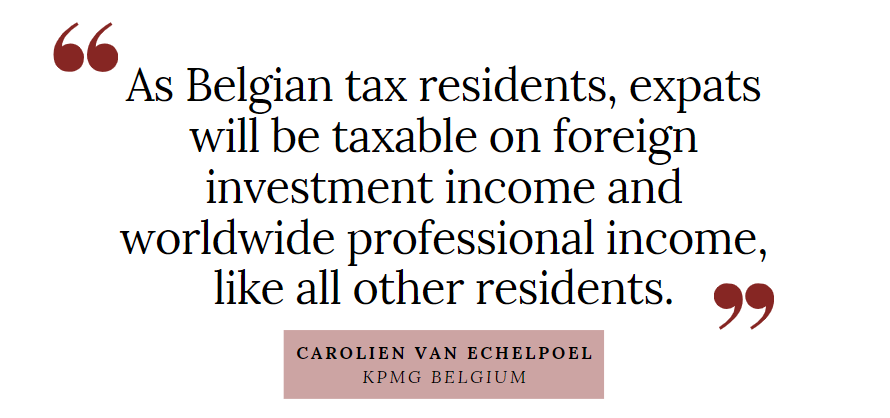From this month, Belgium's former expatriate tax regime – available to foreign executives and researchers hired from abroad – no longer exists. This means that the approximately 27,000 expats affected will see significant changes in their financial and administrative situations.
While Belgium has a reputation for high tax rates, the country's strict fiscal regime generally did not apply to expats living in Brussels: they could benefit from certain write-offs on taxable income and tax deductions for duties performed outside Belgium, for example.
"The expat regime in its current form was introduced in Belgium in 1983 to encourage international companies to draw talent to the country. It included a number of favourable tax measures, which lightened the country's heavy tax burden for expats coming to work here," Carolien Van Echelpoel, partner at KPMG in Belgium, told The Brussels Times.
This made Belgium an attractive option for companies and allowed them to draw the right profiles and talent. "This is also what makes Brussels in particular an international hub for many companies," she added.
Stricter conditions
Over the past 40 years, very few changes have been made to that regime. Until, at the end of 2021, Belgium's Federal Finance Minister Vincent Van Peteghem made the somewhat surprising announcement that the old tax regime for expats would be phased out.
At the same time, new special tax regimes for inbound taxpayers and researchers were introduced. Only those earning over €75,000 gross per year (with the exception of inbound researchers, for whom no threshold applies) can now benefit from certain tax concessions. But as that figure remains out of reach for the majority of expats, it means a big salary cut for many.
"The conditions for the new favourable regime are slightly stricter: a salary limit has been built in, and there is now also a time limit," Van Echelpoel said, explaining that this narrows the group of people who can benefit from it.
While those already subject to the previous system were granted a transition period until the end of 2023, the new regime took effect on 1 January 2022.

Cinquantenaire park. Credit: Mark Ryckaert / Wikipedia
Expats who arrived in Belgium after 1 January 2022 could no longer benefit from the old regime. However, those who had been subject to the old regime for several years and met the conditions could opt to transfer to the new regime or remain under the old regime until 31 December 2023.
"There was a very large group of expats who did not meet the conditions for the new regime, and they could continue to enjoy the old one until 31 December 2023," Van Echelpoel said. "But the old, favourable regime has now been phased out, and no longer exists. From 1 January 2024, tax concessions no longer apply to these expats."
In practice, this means that they are now considered Belgian tax residents, as opposed to non-residents living and working in Belgium under the old regime.
"The main consequence of being a non-resident is that they were only taxable on their Belgian source income," she explained. "Now, as Belgian tax residents, they will be taxable on foreign investment income and worldwide professional income, like all other residents."
End of transition period
According to figures from the tax authorities, 27,251 people benefited from the old tax regime in assessment year 2023. Of those, some 2,100 have opted to switch to the new special regime – just under 10%.
There could be several reasons to explain why the remaining 25,000 have not done so, said Van Echelpoel. "This includes people who returned to their home country or found another job and the regime no longer applies to them, but also those who just do not meet the conditions to transfer to the new regime."
The new regime also requires that those moving to Belgium must not have lived within 150 km of the Belgian border for five years before the move. "If someone moves to Belgium from Lille (France) or Tilburg (the Netherlands), they are no longer eligible."
"Whatever the reason, the group of people still able to enjoy favourable tax measures is now significantly smaller," she said.
The large majority of expats in Belgium are now subject to the country's personal income tax and also have a number of other obligations in terms of declarations they have to file and income they have to declare.
Importantly, they will now also have to report their foreign bank accounts to the National Bank – which they did not need to do before. Expats who own property abroad will now also have to report it to the administration, which will assign a foreign cadastral income to it.
"These situations are very typically the case: people moving here already have a history abroad – which often means an apartment or a house – before they moved here," Van Echelpoel said. "But from now on, they also have to register them here."
She acknowledged that these conditions make Belgium less fiscally attractive to a certain group of people, but added that "this is an evolution that we are seeing in other countries as well."


